Covid-19: Northern Ireland's R-rate 'falls significantly'
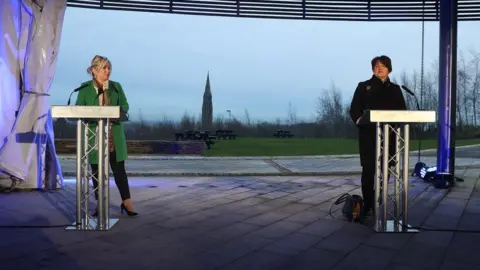 PA Media
PA MediaA fall in Northern Ireland's rate of Covid-19 infection has been achieved by many people "doing the right thing", Arlene Foster has said.
But she said she was concerned by reports of some employers not adhering to the "stay-at-home" order for staff.
Earlier, ministers also discussed a potential crackdown on larger retailers selling non-essential items.
The first minister said that was a "selfish spirit" which would not help beat the virus.
Stormont's first and deputy first ministers were appearing in Dungannon, County Tyrone, at their first joint press conference in more than a month.
Their comments came as a further 1,205 cases of the virus were reported by Northern Ireland's Department of Health on Tuesday.
Twenty-two more people have died with the virus, taking the department's total number of deaths to 1,498.
There are 785 people in hospital with Covid-19, 55 are in intensive care.
The reproductive rate of the virus - known as the R rate, measures the infection rate of Covid-19 and had risen to about 1.8 due to Christmas relaxations.
But it has now fallen "significantly", according to the Chief Scientific Adviser Prof Ian Young.
The first and deputy first ministers will meet the PSNI Chief Constable Simon Byrne on Tuesday evening to discuss enforcement of the coronavirus laws.
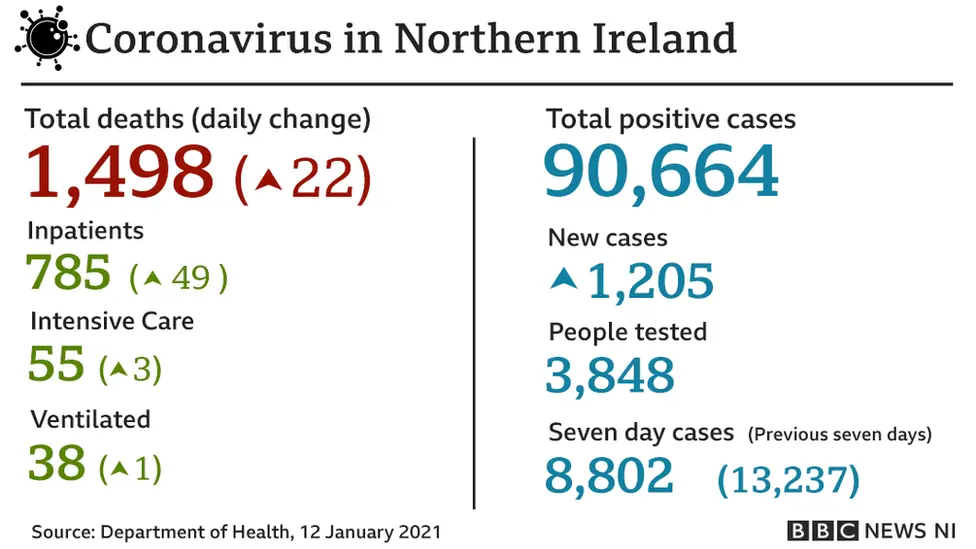
'It's choosing to phone rather than visit'
Michelle O'Neill, NI's Deputy First Minister, said there would also be an "urgent roundtable" with the retail sector to reinforce the need to "comply with the spirit and letter" of the restrictions.
"Adherence will get us through this difficult period," said Ms O'Neill.
Northern Ireland is in the third week of a six-week lockdown, with many sectors forced to close.
People have also been told they should only leave home for exercise, food and medical needs or if they cannot work from home.
Mrs Foster said the evidence provided to ministers showed that the restrictions were working, and she paid tribute to the public for complying.
"It's people choosing to Facetime and phone friends rather than visiting, it's doing one big shop and not nipping out every day, doing the best job you can at home and not going into the work place when you don't have to," she added.
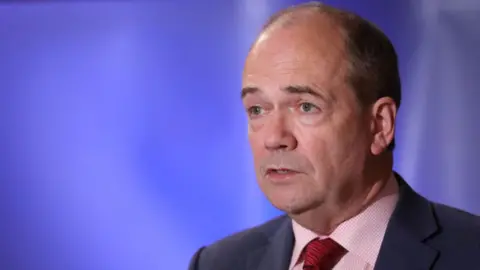 Pacemaker
PacemakerMeanwhile, Northern Ireland's chief medical officer warned that there are "some hard yards to go" and lockdown would not be ending soon.
"I'm not certain we will be emerging from lockdown in February. I think that would be optimistic in the extreme," said Dr Michael McBride.
"We have a long, long way to go with this virus. I don't think any of us can anticipate a return to normality come the 6th of February."
Mr McBride said restrictions would be in place for a considerable number of months, until a time when more of the population who are extremely clinically vulnerable are vaccinated.
Earlier, Prof Young said Northern Ireland had passed the peak in terms of new cases of Covid-19 for this wave of the pandemic.
But he warned: "We still have a long way to go and the number of cases we are seeing each day is still averaging well over 1,000 cases a day - which by any measure in the course of the epidemic represents a very high level."
He said he expects the number of hospital inpatients to continue to rise "until some time in last two weeks in January".
Prof Young said he believed that the current restrictions are "sufficient" for the moment, if people stick to them.
 Pacemaker
PacemakerCompliance 'not as good as in March'
Northern Ireland's chief medical officer Dr Michael McBride said it was estimated that on average about one in 60 people have Covid-19 in Northern Ireland.
He said the rising number of cases was a "payback" for the relaxation of restrictions in December.
New lockdown restrictions came into force in Northern Ireland on Friday 8 January, meaning people can only leave their home for essential reasons.
Prof Young said while compliance with the stay-at-home order was better than it was at the start of December, it was still not as good as it was in the first lockdown in March.
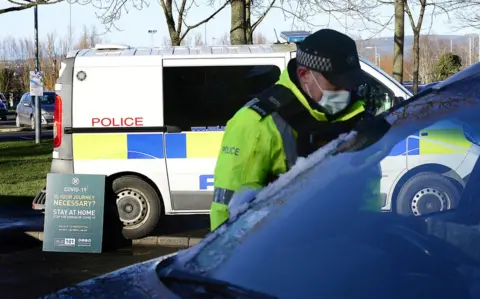 Pacemaker
PacemakerAmid the pressure on the health service, health trusts have said more cancer operations could be cancelled.
The Belfast Health Trust has already cancelled urgent cancer surgeries.
'Taking toll on health staff'
Father James O'Reilly, a chaplain at Antrim Area Hospital, said he has been called to the hospital almost every day in the past year to give Covid-19 patients their last rites and to provide comfort to families and staff.
Speaking to BBC Radio Ulster's Good Morning Ulster programme he said: "You can see the toll it's taking on the nurses and doctors now.
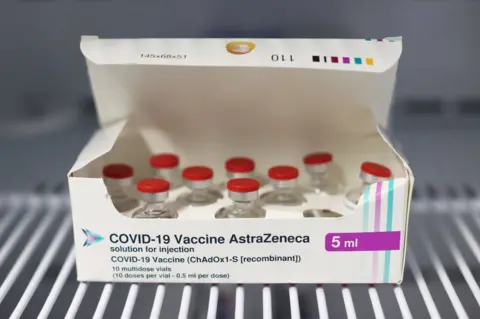 PA Media
PA Media"They are giving everything and quite honestly they don't have much more to give it seems.
"That's a scary thought because they're our last line of defence against this disease."
Vaccinations continue
As of Monday evening, almost 92,000 people in Northern Ireland had received at least one dose of a Covid-19 vaccine.
Dr Frances O'Hagan, whose clinic in Armagh city began vaccinating people aged over 80 last week, expects to have administered the jab to more than 300 patients by the end of the week.
Allow X content?
She said she hoped to get more stock of the vaccines "very shortly" for the next groups on the priority list.
"We are ready to go... we will get those [vaccines] into patients' arms as soon as they are given us," she added.
